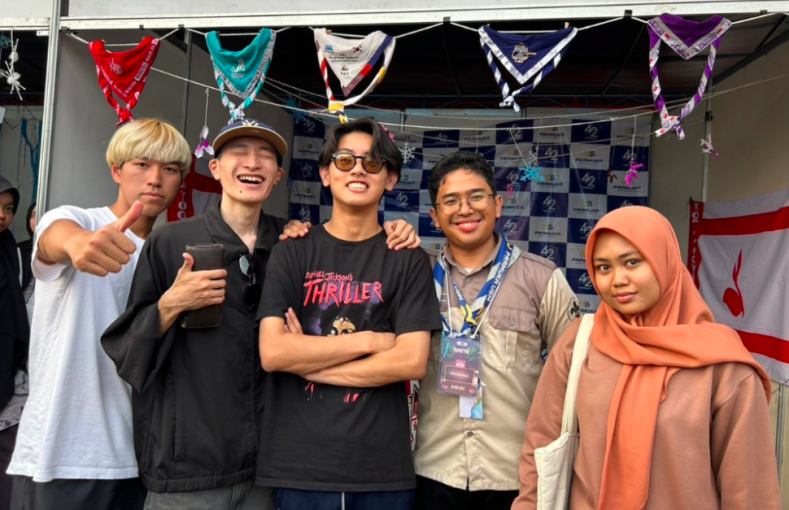
Yogyakarta, 17/4/2025 – Behind the warm class meetings and intimate cross-cultural discussions is the story of a young tutor who made teaching his calling. Iqbal Tafqy Aunika, a History student in the class of 2022, started his journey with Gadjah Mada University’s Indonesian Culture and Language Service (INCULS) in June 2024. The decision to join was not solely because of academic interest but rather because of the challenges faced when teaching Scout extracurriculars. When he realized he had never taught Indonesian in theory, Iqbal saw this opportunity as a space to learn, grow, and go beyond his comfort zone.
For more than a year, Iqbal has been a teacher for students from various programs, such as the Gadjah Mada Immersion Fellowship (GMIF) and Kokushikan. However, being a tutor is not just about delivering material for Iqbal. He believes that the key to learning lies in relationships between people. Therefore, he always starts by getting to know students’ hobbies and interests and then uses that as a bridge to build closeness. This approach makes the class atmosphere more fluid and makes students feel welcome, even when cultural differences are stark.
Iqbal often uses flexible methods by combining communicative and grammatical approaches, balancing them with class situations, and inserting humor to make the lessons feel light. He does not hesitate to explore the city with students, introducing Yogyakarta as a living cultural learning space. “If we know what they like, learning is no longer rigid. They become more courageous in asking questions and discussing things, and they are interested in getting to know Indonesia more deeply,” he explained.
There are certainly challenges, especially in beginner classes. The process of understanding students is often slow at first. However, Iqbal faces it with patience and creativity. One experience that left a lasting impression was when a student from Pakistan asked about slang words in Indonesian. Instead of laughing, Iqbal used it to discuss language ethics and social context. This kind of dialogue opens up space for mutual respect while also showing the complexity of culture more honestly.
For him, being a tutor is also being the face of Indonesia. When introducing batik, for example, Iqbal shows the motif or pattern and conveys the philosophy behind it. In this way, he hopes that international students will learn about Bahasa Indonesia and capture the values that shape Indonesian society. “We are, indirectly, cultural delegates,” as said. He believes that from the small classroom, the first impression of Indonesia emerges that can stay in the students’ memories for a long time.
The INCULS experience also taught Iqbal a profound lesson. He became more sensitive to differences, learned to appreciate other cultures, and realized the importance of building equal relationships. He still maintains communication with students he has taught, strengthening the bonds that have been formed not only as teachers but also as friends.
Iqbal is committed to continuing to tutor during his studies. According to him, INCULS is not just a place to teach but a space for growth that opens up new horizons. He hopes that in the future, INCULS can introduce Indonesia from a broader perspective, from traditional dances and clothing to daily life that is rich in local values.
“You can learn Bahasa Indonesia from anywhere,” he said. He says the most important thing is the spirit to understand and the courage to open yourself up. In language, there is culture, and in culture, there is the way we humanize humans.
[Public Relation of INCULS UGM, Thareeq Arkan Falakh]

